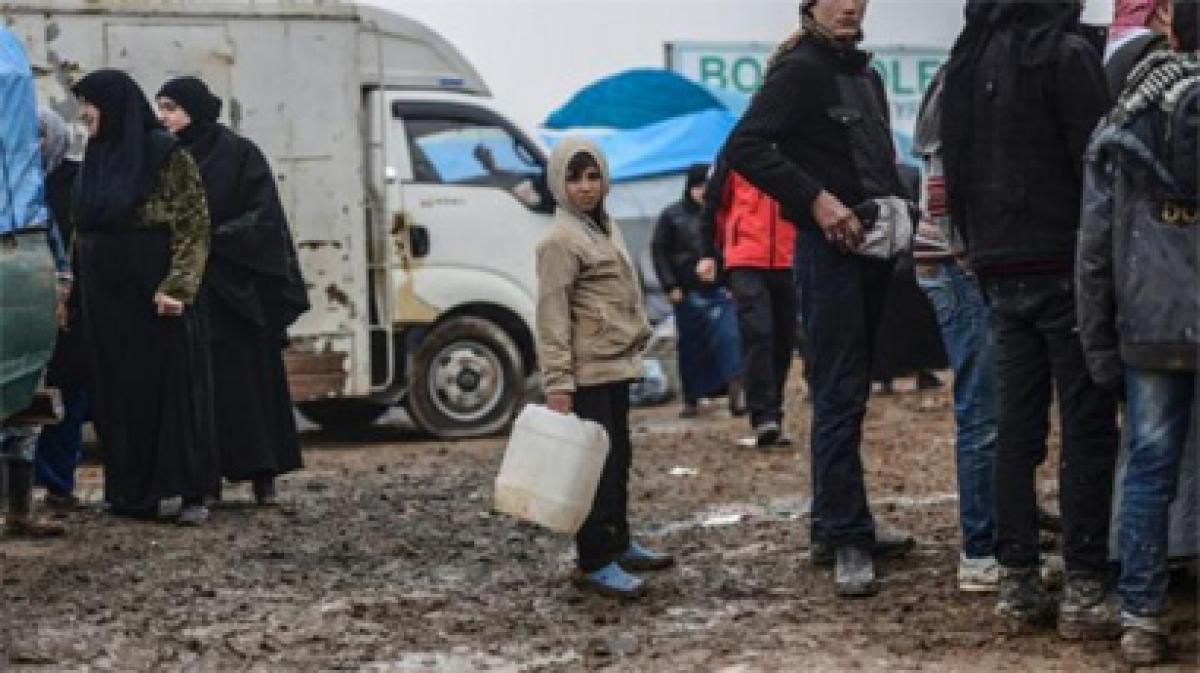Live
- Bihar: Inquiry initiated against principal who went to buy veggies during school hours
- TN: DMK postpones executive meet due to heavy rains & Parliament session
- Porous silicon oxide electrodes can fix durability issues in batteries: Researchers
- Jalandhar civic polls: AAP promises launch of 100 e-buses, round the clock water supply
- Economic upliftment of rural women is priority of Tripura govt: CM Saha
- Rajmata Jijabai Trophy: Manipur move to top of the table, T.N register first win
- Italian envoy Baroli hoping to strengthen ties with India through football
- CPI-M revokes suspension of Bengal party leader accused of sexual harassment
- Rachakonda Commissioner Emphasizes Health and Education at Uniform Diet Launch
- BJP leader visits late ASI Surendra Singh in Rajasthan, assures full govt support
Just In

Russian and Syrian government forces on Saturday intensified an assault on rebel-held areas around the Syrian city of Aleppo that has prompted tens of thousands to flee to the Turkish border to seek refuge.
Russian and Syrian government forces on Saturday intensified an assault on rebel-held areas around the Syrian city of Aleppo that has prompted tens of thousands to flee to the Turkish border to seek refuge.
The assault around Aleppo, which aid workers have said could soon fall to government forces, helped to torpedo Syrian peace talks in Geneva this week. Russia’s intervention has tipped the balance of the war in favour of President Bashar al-Assad, reversing gains the rebels made last year.
Any hopes of a ceasefire were dampened by Assad’s foreign minister, who said it would be all but impossible to stop the fighting while rebels were able to pass freely across the borders with Turkey and Jordan.
Taking full control of Aleppo, Syria’s largest city before the civil war erupted five years ago, would be a huge strategic prize for Assad’s government in a conflict that has killed at least 250,000 people across the country and driven 11 million from their homes.
Advances by the Syrian army and allied militias, including Iranian fighters, are threatening to cut off rebel-held zones of the city, still home to around 350,000 people, while more than a million live in government-controlled areas.
Mevlut Cavusoglu, foreign minister of Turkey, which has already taken in 2.5 million Syrians, said up to 55,000 were now fleeing to the frontier.
Camps on Syrian side
Cavusoglu said the border was open, but at the Oncupinar crossing near the Turkish city of Kilis, which has been largely shut for nearly a year, refugees were being shepherded into camps on the Syrian side.
The local governor on the Turkish side of the border, Suleyman Tapsiz, said around 35,000 Syrians had reached Oncupinar in the space of 48 hours.
“Our doors are not closed, but at the moment there is no need to host such people inside our borders,” he said.
A Turkish aid official said the refugees on the Syrian side were safe and being given food.
One camp was teeming with women and small children, some of whom carried bottles of water or played in the mud. Some of the tents were ripped and dirty while others, provided by a Turkish aid organisation, appeared new.
One refugee, Muhammed Idris, said he had fled from the nearby Syrian town of Azaz, counting on the open-door policy touted by Turkish President Tayyip Erdogan. After four days, he was still waiting to get in.
“Before, Tayyip Erdogan was saying on TV that Syria and Turkey are brothers, but now he is not opening the doors,” he told Reuters. “Our houses are destroyed and we came to his house. Where else should we go?”
A Reuters reporter at Oncupinar could hear occasional shelling and saw several Turkish ambulances cross the border.
On the Turkish side, dozens of refugees who had already made it in queued up to beg the authorities to allow their relatives in, or to cross the border in the hope of bringing them back.
‘Thousands waiting’
Sitting in his car with his four children just inside Turkey, Ahmet Sadul, 43, was hoping to get back into Syria to look for relatives from Azaz.
“Now there are thousands of people from Azaz all waiting on the other side. They escaped from the Russians. I want to go and get my relatives. They are bombing Syrians all the time.”
“Many people have left Aleppo. But still there are many civilians there. If Russia is successful, we are all dead.”
Russia denies targeting civilians and says its actions are aimed at shoring up Syria’s legitimate government and combating terrorism. The West and Turkey, which want Assad to step down, accuse Moscow of using indiscriminate force.
Syria has been emboldened by Russia’s intervention. Foreign Minister Walid al-Moualem told a news conference on Saturday that Damascus would resist anyone who launched a ground incursion into its territory.
“Those (who do so) will return to their countries in coffins,” he said, adding that no ceasefire would be possible unless borders were sealed.
The comments appeared to be aimed at Saudi Arabia and Bahrain, which said this week they were ready to participate in any ground operations in Syria that the US-led coalition fighting Islamic State militants in Syria and Iraq decided to mount.
The Syrian Observatory for Human Rights, which collates witness reports, said fighting continued in areas north of Aleppo, and that government and allied forces were also attacking villages to the east of the city and to the southwest, around the main highway to Damascus.

© 2024 Hyderabad Media House Limited/The Hans India. All rights reserved. Powered by hocalwire.com







